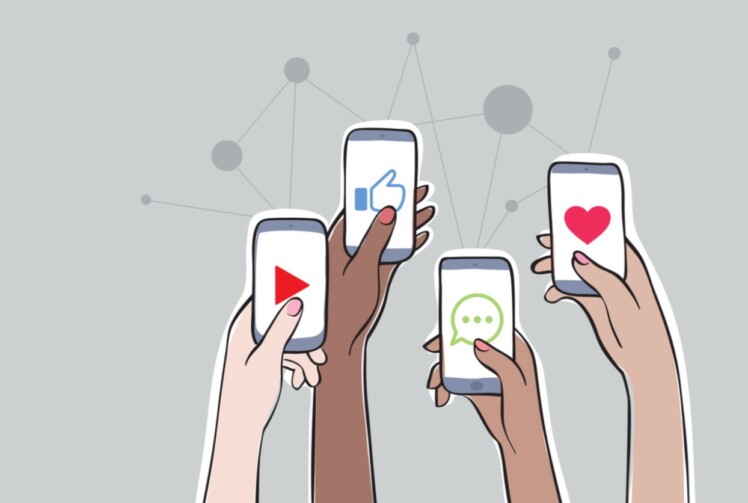Social media has become a staple in most people’s lives. It’s a great way to stay connected with friends and family, but it can also be a breeding ground for negative thoughts and feelings. That’s why it’s crucial to practice social media hygiene. In this article, we’ll discuss social media hygiene and how to maintain it.

Source: reputationtoday.in
Contents
What is Social Media Hygiene?
Hygiene is vital for your physical health. You can lead your best life by cleaning your body, eating a balanced diet, and exercising.
Just like you must shower and brush your teeth every day, you should also care for your mental health. However, sometimes it’s difficult to decipher which habits are helping you or hurting you.
For instance, social media seems like a great tool on its surface. Apps like Facebook and Instagram help people connect with friends and family, find events and communities, and make it easier to get involved with the activities you like. Social media has also proven helpful for small business owners because it allows them to analyze their competition, reach new audiences, and get to know their target audiences.
Even though social media might be helpful in many ways, too much of it can cause negative feelings and, in extreme cases, make you act differently. That’s why experts call for social media hygiene practices: a way to keep yourself “clean” from online negativity.
Before jumping into how to practice social media hygiene, it’s essential to understand how your social media environment makes you feel and the symptoms of poor social media hygiene.
Observing How You Feel on Social Media
Everyone knows the feeling: you’re scrolling through your social media feeds and see something that makes you feel bad. Maybe it’s a friend bragging about their new vacation or an ex with their new partner. Whatever it is, it leaves you feeling a little down.
But why does this happen? And more importantly, what can you do about it?
The first step is to become more aware of how you feel when using social media. Pay attention when you feel jealous, inadequate, or sad. Write down what you were looking at when you had that reaction.
Also, note your breathing patterns when you’re on social media. Is your heart pounding? Try and identify what you saw to make you feel that way.
Once you’ve become more aware of the things that trigger negative emotions, you can start to do something about them. If specific topics always seem to get you down, then you can minimize that content from your feed by blocking or unfollowing the accounts that make you feel that way. Alternatively, more and more people are leaving social media altogether.
Whatever you decide to do, we’ve put together a few tips for practicing good social media hygiene.

Source: medium.com
Turn Off Your Notifications
Some of the most accessible and significant changes are right before your eyes. Turning off your notifications is one of them.
In your app settings, your phone should have an option to “turn off all notifications.” Select it, then go through each app to decide whether you want notifications from it. Because, more often than not, all notifications do is give you the sense of “FOMO” or “fear of missing out.”
By being selective with your notifications, you’ll find that the only information you’re receiving is the stuff that matters to you. Additionally, it’ll help you stay focused on what’s essential in your life.
Play Games
Often, people forget that there are other things they can do on their phones other than scrolling through social media – like playing games!
Games like Farmville and Mafia Wars can help you learn how to manage your time, communicate with others, and appreciate the simple things. Additionally, games like poker can help you build strategy and concentration skills. There are some great places to play free online games, and sites like PokerNews further help in finding the best free games.
On the other hand, you can also try these games and activities “IRL” or “in real life.” After practicing with the free games, you can host a poker night with friends. Likewise, you can try your hand at gardening to get the feel of Farmville.
The most important thing to remember here is that you have hobbies outside social media apps. You’re more likely to feel satisfied with various activities within your reach.

Source: unsplash.com
Get an Alarm Clock
About 62% of people sleep with their phones nearby, making it all the more tempting to grab them when they can’t sleep or as soon as they wake up.
Many people use the alarms on their phones to wake up, making it more difficult to separate themselves from their devices. It may sound silly, but get an alarm clock!
Put your phone in another room, or somewhere where it’ll be difficult to reach. Getting an alarm clock is a lot like a buffer between you and what’s online. Observe how this space makes you feel. Do you need more or less space?
Sometimes, a simple hardware change will make you less dependent on your phone. Look at your apps and see what things you can replace and what you can live without.
Leave Your Phone at Home
If you like the distance between you and your phone in the mornings and evenings, try experimenting with a little more distance.
On a day when you don’t have anything pressing to do, try leaving your phone at home. Taking time for yourself will help you be more present in the moment and enjoy your surroundings. Additionally, it will allow you to have some much-needed face-to-face interaction time with the people around you.

Source: Pandasecurity.com
Final Thoughts
Social media is a valuable tool, but taking it in small doses is necessary for your sanity. Everyone is different, so try experimenting with additional measures to see what works best for you. Some people just need to turn off unnecessary notifications, while others prefer larger blocks of time away from their devices. In any case, practicing good social media hygiene is vital in the long term.
